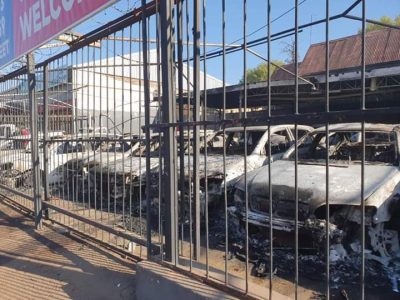Tit for South Africa, tat for Nigeria
Perhaps that weird sense of remove and distance from the burning streets of Johannesburg where it was said South Africans had set upon the shops and property of foreign residents, including, perhaps in fact particularly Nigerians, accounts for my inability to quickly grasp the extent of anger and hate that both fueled these burnings and their response in Nigeria. So the streets burned. South Africans setting shops and people ablaze. The South African police earlier in the previous week were said to have murdered a Nigerian in his home in Cape Town under the very noses of his family, including his South-Africa born wife, and the entire gory affair was captured in hidden camera. The next week, a very angry crowd sets upon the property of Nigerians, and other foreign nationals, looting and burning their shops and businesses in Johannesburg. Nigerians. Zimbabweans. Zambians. Tanzanians.

Many of the citizens ironically of what used to be so-called “Frontline states.” The xenophobic attacks as some have described it, has been gassed up by comments sometimes made by leading South African politicians and public figures. But to be very fair, numerous South Africans have also risen up to forcefully condemn these attacks particularly on Africans by Africans. So, the mood in South Africa from what I can tell from this secure perch in Stellenbosch is fairly divided. There is a very strong push back in many quarters about this rising xenophobia targeting Africans, particularly Nigerians, who not only are doing businesses in South Africa, and appear to be doing quite well, but are also doctors in many South African hospitals, University Lecturers, professionals in many fields, and are contributing in the public and economic life of South Africa. There are of course Nigerians who have been accused of engaging in criminal activities here in South Africa.
But as far as crime goes, this is a very, very small percentage of the Nigerian population many of whom are doing honest to God businesses, and are caught in the middle of a fierce discontent by poor South Africans who feel that these Africans are competing with them for the small opportunities left for them in South Africa. So, the image of South Africans burning a Nigerian on the street, and burning, destroying or looting the shops and businesses of Nigerians in Hillsborough instigated what can only be described as this game of mindless tit-for-tat, in which Nigerians set upon what they consider South African businesses in Nigeria, burning the MTN advert post in Abuja, closing and looting Shoprite malls in Lagos, and vandalizing the South African Embassy. This is stupid, if you’d all excuse my French! This tit-for-tat response must be discouraged, and I’m glad that the Nigerian Police put down what could have been a potentially bigger event very quickly.
Peace Airline also has proposed to begin evacuation of Nigerians from South Africa. These are, although one understands the impulse behind them, rash moves on the Nigerian side. It is true that Nigeria often feels betrayed by South Africa on account of Nigeria’s very immense contribution to the freedom of South Africans from apartheid, which cost Nigeria dearly also in the international scene, but it must be made clear that South Africa and Nigeria cannot afford to be adversarial nations. These are Africa’s two behemoths, in whose economic, political, and cultural partnership can be the seeds of an African risorgimento, as the great Nigerian political giant, Nnamdi Azikiwe once put it. Perhaps this occasion should be the basis for Nigeria and South Africa to sit down and find new ways in which both countries can stimulate the kind of economic partnership that would free up opportunity for South Africans and Nigerians, and other Africans, so that Africans would not be the ones destroying each other. The fear of the other is a strange sensation. It is driven by something more profoundly self-destructive. These South Africans falling upon the shops and property of other Africans on the pretext that these Africans have “invaded” South Africa and have become economic threats to the poor South African must be re-educated publicly to understand the implications of their actions. South Africa must deal with the situation of profound inequality that drives these actions, and the ontology of self-hatred that makes another African the mirror for the black South African to see their loss of opportunities. Nigeria, whose nationals are resident in South Africa and doing businesses must also discourage tit-for-tat response against South African businesses in Nigeria.
These two great African nations must find common grounds. And frankly, I think the South African proposal for an exchange program with Nigeria is a great place to start. Many South Africans went to school in Nigeria for free during the apartheid era, and made numerous friends as teenagers with Nigerians. It is time for Nigeria and South Africa to use those folks to smoothen out the creases in their current relationship, and chart a smoother cause for the future of both these countries, and for the interest of the African continent.


